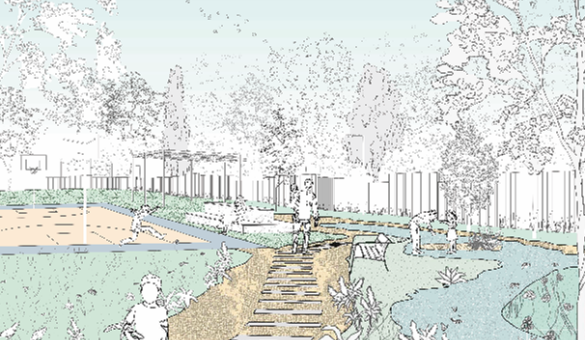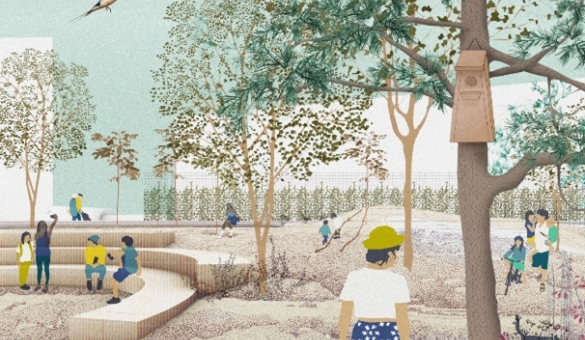City of Madrid, engaging communities in public innovation for PACT-project
The city is actively pursuing a new urban model centered on environmental policies, with a particular emphasis on nature-based solutions as a cornerstone of this transformative vision, aiming to contribute to a healthier, more inclusive, diverse, and resilient urban environment.
Locations in Madrid
We have carefully selected two primary schools and their surrounding areas within the San Cristobal neighbourhood in Villaverde District. Through a collaborative effort that brings together children, school managers, community associations, artists, designers and various public facilities, we aim to develop, implement and assess innovative nature-based solutions, while reimagining the utilization of public spaces.
Two public primary schools in San Cristobal, Villaverde District, in Madrid
Multistakeholder ecosystem: Who Made It Possible?
A strong local alliance has driven LIFE PACT in Madrid. The Madrid City Council, through its Climate and Energy Department, has led the initiative, working closely with the Villaverde District Council to ensure the project addresses local needs and priorities.
At the heart of this process is itdUPM (Innovation and Technology for Development Centre, Universidad Politécnica de Madrid), which has facilitated the co-creation process, orchestrated collaboration among diverse actors, and ensured knowledge generation and systematisation throughout the project.
Together with the two schools, families, cultural organisations, and neighbourhood groups, this partnership has created the conditions for shared learning, long-term ownership, and genuine transformation.
Methodology: How did we do it?
The process was structured in six key phases, combining technical rigour and community engagement:
Video 'The neighbourhood'
Active listening: Mapping existing needs, tensions and local initiatives through interviews, urban walks, and participatory diagnostics.
Video 'The cocreation process'
Co-creation: Over 24 creative sessions with students, teachers, families and local stakeholders to imagine the schoolyards of the future.
Video 'The design project'
Technical drafting: The design teams translated co-created visions into implementable projects, validated by municipal authorities.
Video 'This Playground Is a World'
Evolving communication: Visual materials, videos, and public events made the process accessible and inclusive.
Video 'Childrens assembly'
Participatory evaluation: A dynamic monitoring framework assessed not just outputs, but community impact and institutional learning.
What have we achieved?
- More than 30,000 m² of school and public space reimagined and transformed
- Over 600 people are actively involved across the process
- 33 organisations connected through a shared urban transformation ecosystem
- More than 130 new trees planted, replacing impermeable surfaces and improving microclimate
- Creation of the first water play area in a public-school playground in Madrid
- Public investment mobilised: €5 million
The project has also produced guidelines, educational materials, technical specifications and open-access tools to facilitate replication in other schools across the city.
What comes next?
The Madrid pilot has shown that schoolyards can be powerful drivers of urban resilience and social cohesion. Now, the city is scaling up:
- The methodology is being integrated into municipal climate and education strategies.
- A growing number of schools are showing interest in replicating the model.
- The work done in San Cristóbal feeds into Madrid’s Climate City Contract, within the EU Mission for 100 Climate-Neutral Cities by 2030.
This is not just about two schools — it’s about rethinking how we build greener, fairer, and more democratic cities, starting from the everyday spaces where children learn, play, and dream.
Do you have a question?
Contact us, we are happy to help you.



